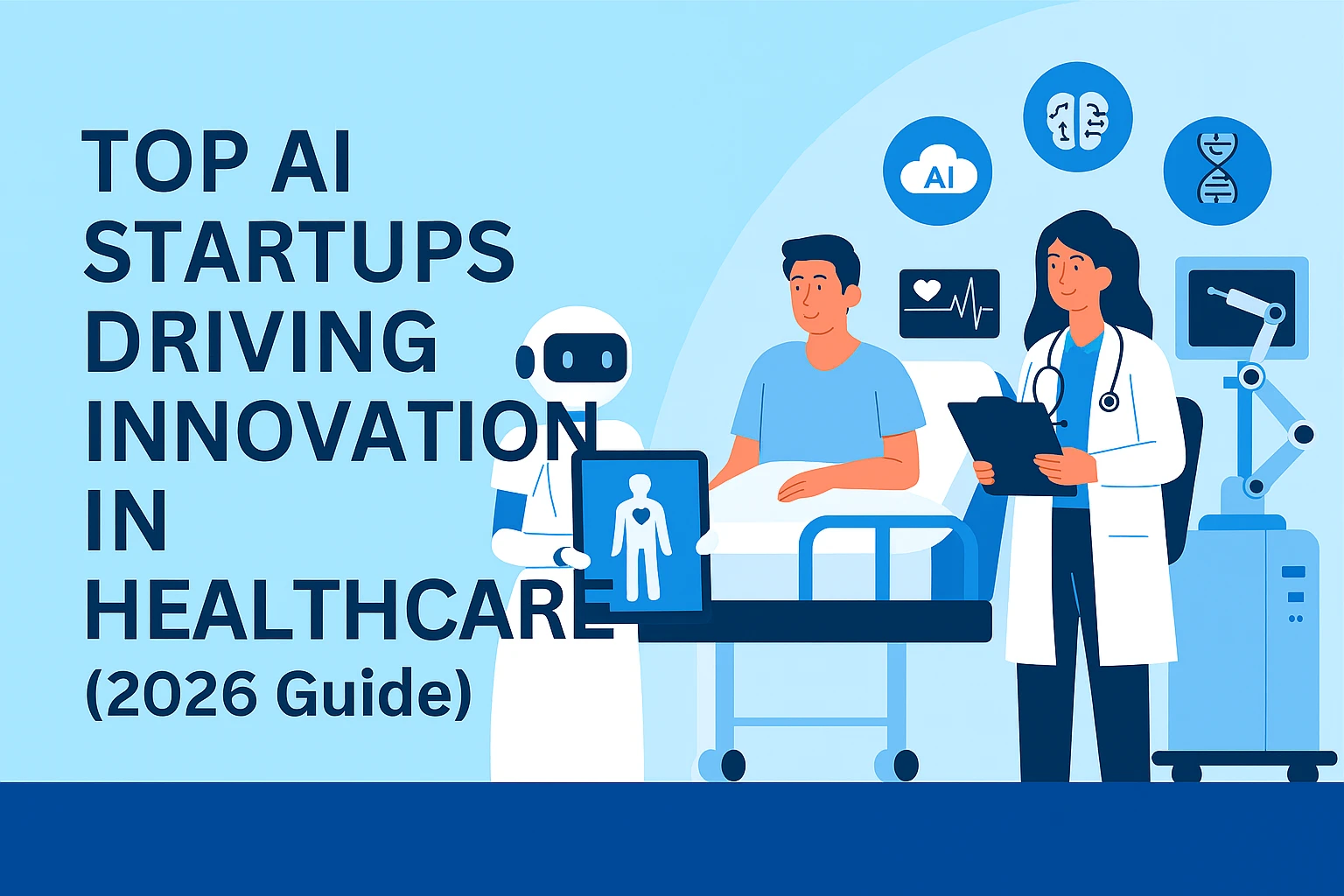Artificial Intelligence (AI) has rapidly evolved from being a futuristic concept to a practical force transforming industries worldwide. Among these, healthcare has emerged as one of the biggest beneficiaries of AI-driven innovation. From improving diagnostic accuracy to enabling personalized treatment plans, AI-powered startups are reshaping the way medical professionals deliver care and how patients access it. As we move into 2026, the convergence of AI, data science, biotechnology, and cloud-based health platforms is set to revolutionize the medical industry in ways previously unimaginable.
Healthcare has always been data-intensive, but the sheer volume of information generated today—ranging from genomic sequencing to electronic health records (EHRs)—has surpassed the capacity of traditional methods of analysis. This is where AI comes in, helping to make sense of complex datasets, identify hidden patterns, and provide actionable insights at unprecedented speed. AI not only enhances the efficiency of healthcare delivery but also democratizes access, especially in regions where medical professionals are scarce.
Moreover, the adoption of AI is no longer confined to research labs or experimental trials. Hospitals, clinics, and even patients at home are now using AI-powered solutions. From AI chatbots guiding initial consultations to predictive analytics reducing hospital overcrowding, the role of startups in mainstreaming these technologies has been monumental. Investors, too, are fueling this growth—funding billions into AI health ventures with the expectation of long-term transformation.
This comprehensive guide will explore the top AI startups driving innovation in healthcare in 2026, their key contributions, and how they are shaping the future of medicine. Whether you are a healthcare professional, investor, policymaker, or technology enthusiast, understanding these developments is crucial for keeping pace with the rapidly evolving digital health ecosystem.
Table of Contents

Why AI in Healthcare Matters in 2026
AI is not just about automation—it’s about enhancing decision-making, reducing costs, and saving lives. By analyzing vast datasets, AI can:
- Detect diseases at early stages (even before symptoms appear).
- Assist radiologists in interpreting medical images with high accuracy.
- Personalize drug recommendations based on genetics and patient history.
- Automate repetitive administrative tasks in hospitals.
- Enable remote patient monitoring through AI-powered wearables.
In 2026, as healthcare systems worldwide grapple with challenges such as rising costs, staffing shortages, and aging populations, AI startups provide scalable, innovative solutions that can bridge critical gaps.
For more on how AI is revolutionizing healthcare, visit our guide on revolutionizing patient care.
Top AI Startups Transforming Healthcare in 2026
Here’s a closer look at some of the most impactful AI-driven startups making waves in healthcare this year:
1. Tempus
- Focus: Precision medicine & oncology
- Innovation: Uses AI to analyze clinical and molecular data to help doctors personalize cancer treatment. Their platform integrates genomic sequencing with clinical data for better decision-making.
- Impact: Enables oncologists to design targeted therapies, improving survival rates and treatment efficiency.
2. PathAI
- Focus: AI-powered pathology
- Innovation: Offers deep learning solutions for pathologists to improve diagnostic accuracy.
- Impact: Reduces misdiagnosis rates and accelerates pathology workflows, especially in cancer detection.
3. Zebra Medical Vision (part of Nanox)
- Focus: Medical imaging AI
- Innovation: Provides radiologists with AI tools for detecting conditions such as osteoporosis, breast cancer, and liver disease.
- Impact: Helps healthcare systems in underserved regions access affordable diagnostic imaging.
4. Biofourmis
- Focus: Remote patient monitoring & digital therapeutics
- Innovation: AI-driven wearable technology that tracks vital signs and predicts clinical deterioration.
- Impact: Reduces hospital readmissions and enables proactive care management.
5. Viz.ai
- Focus: Stroke detection & care coordination
- Innovation: Uses AI algorithms to detect strokes from CT scans and alert specialists in real-time.
- Impact: Saves critical minutes in stroke treatment, reducing disability and mortality rates.
6. Owkin
- Focus: AI-driven clinical research
- Innovation: Applies machine learning to accelerate drug discovery and clinical trial optimization.
- Impact: Shortens drug development timelines and reduces costs, speeding up access to life-saving therapies.
7. Insilico Medicine
- Focus: AI in drug discovery
- Innovation: Uses generative AI to design new molecules and predict drug efficacy.
- Impact: Revolutionizes pharmaceutical R&D by making drug discovery faster and more cost-efficient.
8. Ada Health
- Focus: AI-powered symptom checking
- Innovation: Provides users with an AI chatbot that evaluates symptoms and suggests next steps.
- Impact: Empowers patients to make informed decisions and reduces unnecessary hospital visits.
9. Babylon Health
- Focus: Virtual healthcare & telemedicine
- Innovation: Offers AI-driven virtual consultations, digital triage, and health monitoring.
- Impact: Expands access to affordable healthcare in regions with physician shortages.
10. Freenome
- Focus: Early cancer detection
- Innovation: Uses AI and machine learning on blood tests to detect cancer in its earliest stages.
- Impact: Increases survival rates by enabling timely interventions.
Key Innovations Driving Change
Beyond individual startups, here are the emerging AI innovations reshaping healthcare in 2026:
- Generative AI in Drug Discovery – Designing new drugs faster than traditional methods.
- AI-Powered Imaging – Detecting diseases such as cancer, pneumonia, and fractures with radiology tools.
- Digital Twins of Patients – Creating virtual models of individuals to predict treatment outcomes.
- Wearable AI Health Devices – Smartwatches and biosensors monitoring real-time health data.
- AI in Genomics – Unlocking personalized medicine through DNA sequencing.
- Predictive Analytics for Hospitals – Anticipating patient inflow and optimizing staffing.
Learn how AI is redefining creativity in healthcare innovation at AI Creativity: Exploring the Future of Machine Imagination.
The Future Outlook: AI in Healthcare Beyond 2026
The AI healthcare market is projected to surpass $200 billion by 2030, driven by increasing adoption across hospitals, clinics, and pharmaceutical companies. Some expected developments include:
- Fully autonomous diagnostic systems capable of working without human intervention.
- Widespread use of AI-driven wearable technology for continuous patient monitoring.
- Integration of AI with robotics for advanced surgical procedures.
- Greater accessibility in developing nations through affordable AI health platforms.
For more on AI’s transformative potential, check out Beyond AI: How Artificial Imagination Redefines Innovation.
Frequently Asked Questions (FAQ)
Q1. What role do AI startups play in healthcare innovation?
AI startups drive innovation by introducing cutting-edge solutions in diagnostics, drug discovery, patient care, and hospital management. Their agility allows them to experiment and scale faster than traditional institutions.
Q2. Are AI medical startups safe and reliable?
Most leading AI healthcare startups work closely with regulators like the FDA and EMA, ensuring compliance and reliability. However, safety depends on proper validation and real-world testing.
Q3. How do AI startups reduce healthcare costs?
AI helps minimize unnecessary tests, prevents hospital readmissions, speeds up drug development, and automates administrative tasks—all of which reduce costs.
Q4. Which areas of healthcare benefit most from AI?
Major areas include radiology, oncology, drug discovery, telemedicine, pathology, and personalized medicine.
Q5. Can AI replace doctors in the future?
AI will not replace doctors but will augment their capabilities. Human expertise combined with AI insights leads to more accurate and efficient healthcare delivery.
Explore how AI complements human roles in our article on AI and the Future of Work.
Disclaimer
This article is intended for informational and educational purposes only. It does not constitute medical advice, diagnosis, or treatment. Always consult with a licensed healthcare professional for medical concerns. The startups and companies mentioned are examples based on available data as of 2026 and do not represent endorsements.
Conclusion
AI startups are not just disrupting healthcare—they are redefining it. From early cancer detection to personalized treatment, these companies are at the forefront of medical innovation in 2026. As technology continues to evolve, the collaboration between AI and healthcare professionals promises a future where medicine is more accurate, accessible, and patient-centered.
For investors, practitioners, and patients alike, keeping an eye on these AI-powered innovations is essential to understanding how the medical landscape will transform in the coming years.
Learn more about AI-driven assistants shaping healthcare at AI Assistants: Smart Companions.
For further insights into AI’s impact across industries, visit McKinsey’s AI Insights.


